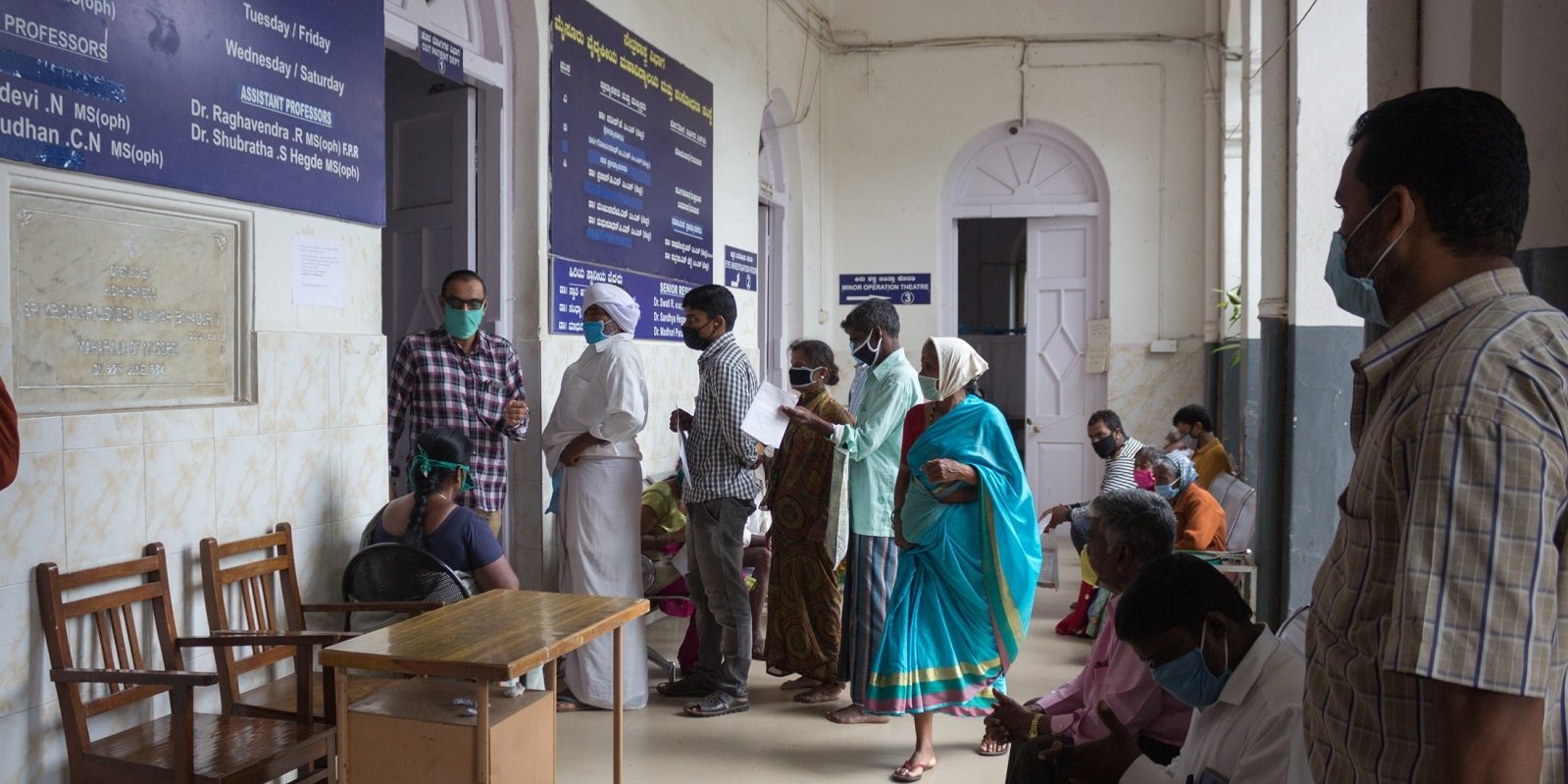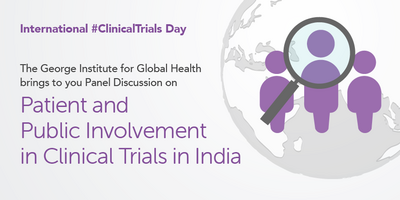
Blog: Patient and Public Involvement in Clinical Trials in India’: Key Reflections
To mark the International Clinical Trials Day on 20 May, The George Institute for Global Health India organised a virtual panel discussion titled ‘Patient and Public Involvement in Clinical Trials in India’, to expand awareness about the importance of patient and public involvement (PPI) in clinical trials and include stakeholders’ perspectives in involving patients and the public throughout a clinical trial. The esteemed panelists included Dr. Bharath Kumar, Intensivist Apollo Chennai, TGI Honorary Fellow; Dr. Anant Bhan, Independent Researcher, Bioethics and Global Health; Dr. Aparna Mukherjee, Scientist E, ICMR, and Ms. DVL Padma Priya, Journalist, and Long-COVID Survivor Group Founder.
Patients and the public continue to be regarded as a source of data in the clinical trial process. The term “Patient and Public Involvement” in a clinical trial broadly stands for a process of “experimenting with” rather than “experimenting on” patients. While the funding agencies and sponsors of a clinical trial in developed countries expect active PPI, the term PPI itself is quite new in India. Even though initiatives have been taken in recent years to ensure public and patient’s active participation in India, quite often the efforts have remained tokenistic. The deep-seated power imbalance in society also impacts the equitable involvement of patients and the public in clinical trials. The panel discussion served as a starting point to discuss various factors that influence the participation and non-participation of patients and the public in clinical trials in India.
The panel discussion was moderated by Dr. Niveditha Devasenapathy, the Better Treatments Lead at The George Institute for Global Health, India. Setting the context for the discussion, Dr. Devasenapathy gave a brief presentation on the importance of clinical trials in evidence synthesis that can help inform policymakers’ decisions regarding the allocation of health care resources. She also touched on the important role of patients, researchers, sponsors, and societies represented by regulatory bodies, future patients, or the public, in dictating the research environment of a country. Highlighting the need to involve the most important primary stakeholder of a clinical trial- the patients and public, Dr. Devasenapathy established that “PPI is important as it emancipates individuals, removes imbalances, gives right to have a say in what is being researched and how, and gives right to know the findings of the research.” During the panel discussion, she called on the panelists to share basic principles and experiences of engaging with patients and the public through specific questions and to dive deep into the opportunities, barriers, and drivers of success for meaningful involvement of patients and the public.
Clinician’s Perspective
Deliberating on the challenges faced by clinicians while recruiting patients in a clinical trial, Dr. Bharath Kumar highlighted two critical challenges faced by his community; apart from stating the usual challenges faced at the regulatory level, operational level, funding level, and in enrolling the patient. First, he drew attention to the long waiting times that the patient and the clinician must go through to seek the results of the trial, which becomes a concern for both patients and clinicians catering to the patient. The second challenge faced by the patients is around random allocation to the placebo drug/standard care vs the experimental drug. Elaborating further, he stated that “we must remember that standard care does not mean ‘no care’, standard care is actually providing good quality care which is backed by the current information that we have.”
As a clinician, Dr. Kumar also stressed the fact that “we must ensure that patients don’t get exposed to unproven therapies, outside the context of a clinical trial; and the pandemic was an excellent illustration of how patients, both globally and in India were often receiving therapies that are not proven.”
Ethics Committee Member Perspective
Responding to the question on the engagement of communities in clinical trials, Dr. Anant Bhan observed that “the true role of someone who is representing the community is to look into the relevance of science to the community”. He further questioned if the current way of designing and conducting research responds to the needs of the community? He further reinforced that communities need to be encouraged and empowered to interact. They must be supported and given equal importance as a clinician or an ethics committee member as respected members involved in a clinical trial.
Dr. Bhan further recounted four main points to ensure the effective participation of patients and the public in a clinical trial. Firstly, complete information about potential risks and benefits of the trial should be conveyed to the community in a simple and effective manner. Secondly, transparent two-way communication between the researchers and the community needs to be implemented to keep away from any kind of misunderstanding or misconception; and to build trust in science. Thirdly, we should think about how we engage the community where they can be leaders in doing their own research studies. Lastly, we must look at community engagement with a rights-based lens- i.e understanding that every community member possesses the right to question, engage and co-own the research; and must make efforts in forging a long-term relationship with communities.
Funders’ Perspective
The panel discussion additionally shed light on the already recognised importance of patients and the public’s involvement in clinical trials in developed countries and drew learnings from the western experience to adapt to the Indian context. Dr. Aparna Mukherjee illustrated the example of the COVID-19 pandemic that brought an opportunity for the public to understand what a clinical trial is and the role played by patients and the public in the process of developing a vaccine. Dr. Mukherjee emphasised that “as funders, sponsors, and also as researchers our responsibility would be to gradually improve the negative perception about a clinical trial. Though at present the grants or publications in India do not ask about public engagement, this is something the Indian researchers are becoming more aware of, and gradually the planning to engage the public will be incorporated into the research planning as well.”
Patient and Public’s Perspective
Sharing the perspective of a patient, Ms. DVL Padma Priya stated the common experience faced by patients where when they ask inquiring questions, oftentimes they are not given the answers. There is a dire need to acknowledge the patients as the best advocates of their own disease and research with a more patient-centric approach even in the design phase of a trial. Ms. Priya also informed how the long-COVID trial was a result of a patient-driven effort where patients came up with their own research questions that led to further collaboration with researchers, patients, and institutions.
Ms. Priya also spotlighted the importance of effective and coherent communication methods and language used while working with patients in the clinical trial process. She added that working with patient organisations and peer support groups can help in translating information from clinicians and researchers into better understandable forms for the communities. “It is really important that the patients be heard, the patients be trusted. The taboo that patients are used as guinea pigs needs to be broken and that can only happen if researchers constantly engage with the patient community”
Way Forward
The panel discussion concluded with panelists’ remarks on the way forward, which comprised of recommendations such as improving empowering clinicians with ongoing training, capacity building in engaging meaningfully with patients, and a strong focus on building mutual trust and respect between patients and clinicians as a cornerstone for true engagement.
“We usually talk about fancy research design, sample size, and data points, but we have to remember that each of these data points is a real human being, when we recognize that, speak to that, an honour that by truly engaging every person that we work with as a relevant stakeholder.” - Dr. Anant Bhan
“Clinicians must have the curiosity to understand their patients. They should think of the patient as someone equal and just starting to trust the patient will go a long way in the patient trusting a clinician.” - Ms. DVL Priya






